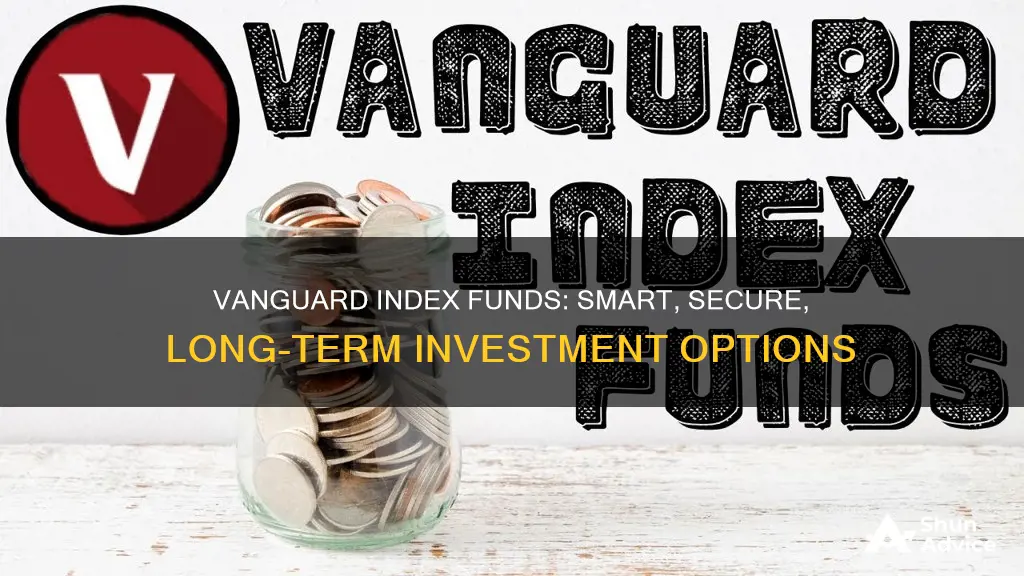
Vanguard index funds are a popular investment option for those seeking a passive approach to the market. Vanguard, founded on the idea that an investment company shouldn't have any outside owners, is uniquely structured to pass on savings to its investors. With over 40 years of experience, Vanguard's funds have delivered consistent long-term returns, outperforming their peer-group averages. Vanguard index funds offer broad diversification, tax efficiency, and low costs, making them an attractive choice for investors looking to build a portfolio with reduced risk and stable returns.
| Characteristics | Values |
|---|---|
| Investment approach | Passive |
| Investment type | Mutual fund or exchange-traded fund (ETF) |
| Investment aim | Match performance of a stock market benchmark |
| Fund holdings | Stocks, bonds or other securities |
| Fund manager role | Not actively buying and selling individual securities |
| Investment options | Sector and specialty funds, balanced funds, target-date funds |
| Investment minimums | Low |
| Expense ratios | Below industry average |
| Diversification | Broad |
| Tax efficiency | Cost-friendly |
| Performance | Solid track record |
What You'll Learn

Low investment minimums
One of the key advantages of Vanguard index funds is their low investment minimums. Most Vanguard index funds have a minimum investment of $3,000, but some funds may require a larger initial buy-in. For example, actively managed funds require a minimum of $50,000, while certain sector-specific index funds require $100,000. However, it's important to note that Vanguard also offers index ETFs (exchange-traded funds), which can be purchased for as little as $1. ETFs can be traded throughout the day, similar to stocks, and often have lower expense ratios.
Vanguard's low investment minimums, combined with their low expense ratios, make them a popular choice for investors seeking low-cost investment options. The expense ratio represents the annual cost of owning an index fund or ETF as a percentage of assets. Vanguard's average expense ratio across its index funds is significantly below the industry average, resulting in cost savings for investors.
Vanguard's low investment minimums and fees make it easier for investors to diversify their portfolios. By investing in a Vanguard index fund, individuals can gain exposure to a diverse range of stocks, bonds, or other securities within the underlying index. This diversification helps to balance risk and reward, as Vanguard funds offer the potential for higher returns with increased risk.
Additionally, Vanguard's low investment minimums provide accessibility to a wide range of investors. With a minimum of $3,000, individuals can start investing in Vanguard index funds and benefit from their broad diversification and low costs. This accessibility is particularly advantageous for beginner investors or those with limited capital who want to invest in a well-diversified portfolio.
Overall, Vanguard's low investment minimums, coupled with their low expense ratios, make them an attractive option for investors seeking cost-effective ways to diversify their portfolios and access a wide range of investment opportunities.
Mutual Funds Backing AMD: Who's Investing in the Tech Giant?
You may want to see also

Low costs
Vanguard index funds are a popular option for investors looking for low-cost investment opportunities. The company's unique structure, where funds own the company and investors own the funds, means that Vanguard is not distracted by the demands of private owners or other outside interests. As a result, any savings from new economies of scale are passed directly to investors.
Vanguard's average expense ratio across its index mutual funds and ETFs is significantly below the industry average. As of December 31, 2019, Vanguard's average mutual fund expense ratio was 0.10%, with an average index ETF and mutual fund expense ratio of 0.05% as of December 31, 2023. This is 72% less than the industry average.
Vanguard's low costs are also due to its passive investment strategy, where funds seek to match the performance of a stock market benchmark rather than beating it. This passive strategy also has tax benefits, as securities are exchanged less often, helping investors better manage their tax liability.
Vanguard's low-cost investment funds allow for easier diversification, as investors can invest with the goal of matching a specific index. The company offers a wide range of funds with low investment minimums, providing investors with the advantage of variety when deciding which funds to invest in.
Vanguard's low costs, solid track record of performance, and broad diversification make it a popular choice for investors looking for low-cost investment opportunities.
Money Market Funds: When to Invest for Maximum Returns
You may want to see also

Broad diversification
Vanguard index funds are also professionally managed, saving investors time and effort. The funds are designed to match the performance of a specific market benchmark, such as the S&P 500, rather than trying to beat it. This passive investment strategy means that Vanguard index funds are more cost-efficient than other types of mutual funds.
Vanguard's average expense ratio is significantly lower than the industry average, at 0.09% compared to 0.49%. The expense ratio represents the yearly cost of owning an index fund or ETF as a percentage of assets.
Vanguard's index funds also allow for easier diversification, as investors can invest with the goal of matching a specific index. Like other mutual funds, Vanguard funds balance risk with rewards, with greater risk leading to greater potential returns.
Vanguard offers a wide range of index funds to choose from, including:
- U.S. bond funds
- U.S. stock funds
- Balanced funds
- International stock funds
- International bond funds
- Sector and specialty funds
Roth Funds: Where to Invest and Why
You may want to see also

Passive investment strategy
A passive investment strategy is one in which investors try to meet rather than beat market moves for long-term gains. Vanguard index funds are a popular option for investors who prefer this approach.
Vanguard is a uniquely structured company that passes on savings to its investors. It is not distracted by the demands of private owners or other outside interests. The company was founded on the idea that an investment company shouldn't have any outside owners. As a result, Vanguard's funds own the company, and investors own the funds.
Vanguard index funds are a type of mutual fund or exchange-traded fund (ETF) that tracks the performance of a specific market benchmark or "index", such as the S&P 500 or Nasdaq. These funds aim to match the performance of the index as closely as possible, rather than trying to beat it. This is what makes them a passive investment strategy.
Vanguard's first index fund was created in 1976 by Jack Bogle. This fund, the Vanguard 500 Index Fund, tracks the S&P 500 index, which includes the 500 largest companies in the US. As of 2022, Vanguard offered more than 100 index mutual and exchange-traded funds.
Vanguard index funds are professionally managed and have a solid track record of performance. They are also cost-effective, with an average expense ratio that is significantly below the industry average. The funds have instant diversification, low costs, and broad diversification in a simplified package.
Vanguard's index funds allow for easier diversification since investors can invest with the goal of matching a specific index. The funds balance risk with rewards, with greater risk leading to greater potential returns.
Vanguard also offers index funds that mirror the bond markets. These funds buy and sell government and corporate debt and are considered safer investments, but they typically have smaller returns.
Mutual Fund Secrets: Uncover PRI Investment Opportunities
You may want to see also

Long-term consistent returns
Vanguard index funds have delivered consistent long-term returns. According to Vanguard, 83% to 84% of its index funds have outperformed their peer-group averages over the past decade.
Vanguard's index funds are designed to match the performance of a specific market benchmark, like the S&P 500 Index, as closely as possible. This is known as a passive investment strategy. The funds hold all the stocks, bonds, or other securities that its underlying index owns. This passive strategy means the fund manager isn't actively buying and selling individual securities, which can result in fewer taxable capital gains distributions from the fund, potentially reducing your tax bill.
Vanguard's first index fund was created in 1976 and the company has been perfecting its benchmark selection and tracking skills ever since. The longer track record of the funds means that investors can have more confidence in their consistent performance over time.
The passive strategy of Vanguard's index funds also helps to keep costs low. The average expense ratio across Vanguard's index funds is 72% lower than the industry average. Lower costs mean that more of your returns and investment growth are kept by you, the investor.
Vanguard's index funds also offer broad diversification, which helps to lower risk. Each fund contains a preselected collection of hundreds or thousands of stocks and/or bonds. This means that if a single stock or bond performs poorly, there is a good chance that another is performing well, minimising your losses.
Mutual Fund Strategies: Deposits and Investments Timeline
You may want to see also
Frequently asked questions
Vanguard Index Funds are a type of mutual fund that aims to match the performance of a specific market index, such as the S&P 500, by investing in a diversified portfolio of assets that track an underlying market index.
Vanguard Index Funds offer stable and consistent returns with low investment fees, making them a good choice for those who prefer passive investing. They also provide instant diversification and low costs without requiring a lot of effort.
You can invest in Vanguard Index Funds by opening an account directly with Vanguard or through another brokerage firm that offers Vanguard funds. You will need to decide on the type of account, such as a traditional or Roth IRA, or a taxable brokerage account. Then, you can choose the specific Vanguard Index Fund you want to invest in, considering factors such as the fund's expense ratio, historical performance, and minimum investment requirements.







